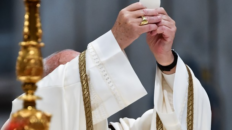In this Sunday’s Gospel, Jesus starts a healing ministry that changes whole communities and touches each of us individually.
It begins with his healing of Simon’s mother-in-law, who has a fever, but it soon grows such that “the whole town was gathered at the door.”
That is because Jesus heals people in more ways than one.
1: First, he heals our bodies
When Simon’s mother-in-law is sick, says the Gospel, “They immediately told him about her. He approached, grasped her hand, and helped her up.”
It is always the same: Someone is sick; we tell Jesus; he reaches out.
This three-step process has happened throughout time ever since. Christians care for the weak; they bring them to Christ; he makes them strong.
It will work in the lives of our loved ones as well. When they are sick, “immediately tell him.” He will grasp their hand.
2: He heals our minds
“They brought to him all who were ill or possessed by demons,” says the Gospel. Soon, he was, “preaching and driving out demons throughout the whole of Galilee.”
The first thing to recognize here is that the Gospels clearly understand the difference between disease and demons. One needs a cure; the other needs an exorcism. Jesus did both throughout the Gospel. Today, the need for exorcism is only increasing.
But it also points to another kind of healing. In ancient monastic literature, demons are pictured as gruesome hidden companions dragging us away from our duty. Jesus heals us from that, too.
3: He heals the brokenhearted
At one point in today’s Gospel, Jesus interrupts all the curing and expelling of demons to say, “Let us go to the nearby villages that I may preach there, also.”
He urgently wants to go and meet as many people as he can, bringing the Good News. Why? Because without God, people feel the way Job does in our first reading.
“I have been assigned months of misery,” says Job, “and troubled nights have been allotted to me. If in bed I say, ‘When shall I arise?’ then the night drags on.”
The life he is describing is the life of a sick person. It is also the life we all have without God.
But God “heals the brokenhearted,” says the Psalm. With God, life has everything it needs, spiritually: meaning, purpose and consolation.
Often, God allows us to stay sick; but when he does, it is so that he can heal our broken hearts.
4: He heals shyness
God doesn’t just heal our broken hearts; he heals our worried, self-conscious hearts, too. St. Paul makes that clear in his famous words from today’s second reading, “Woe to me if I do not evangelize!”
Being Christian is a boon to shy people.
Think of the new kid at a new school. The new kid is lost and alone; unrecognized by all and unwanted by most. But there is one person for whom the new kid is a golden opportunity: The shy person at the school. A new kid is someone the shy person can relate to, approach, and help.
Well, if Jesus Christ truly is God’s way of showing the world how to find happiness, and he is, then there are a lot of “new kids” that shy people can approach. In fact, we have to.
“To the weak I became weak, to win over the weak,” says St. Paul. “All this I do for the sake of the gospel, so that I too may have a share in it.”
5: God heals through us
God has set up that the world such that new kids can’t find their way around the school without help. He has also set up the world such that we only find healing with help.
That goes for the sick, whose intercessors bring them to the Lord, and that goes for those without God, too.
They will never find him without us. And he expects them to find him.
“If I preach the gospel, this is no reason for me to boast,” says Paul, “for an obligation has been imposed on me, and woe to me if I do not preach it!”
Woe to us if God doesn’t heal those around us who need it.
Source: aleteia.org






